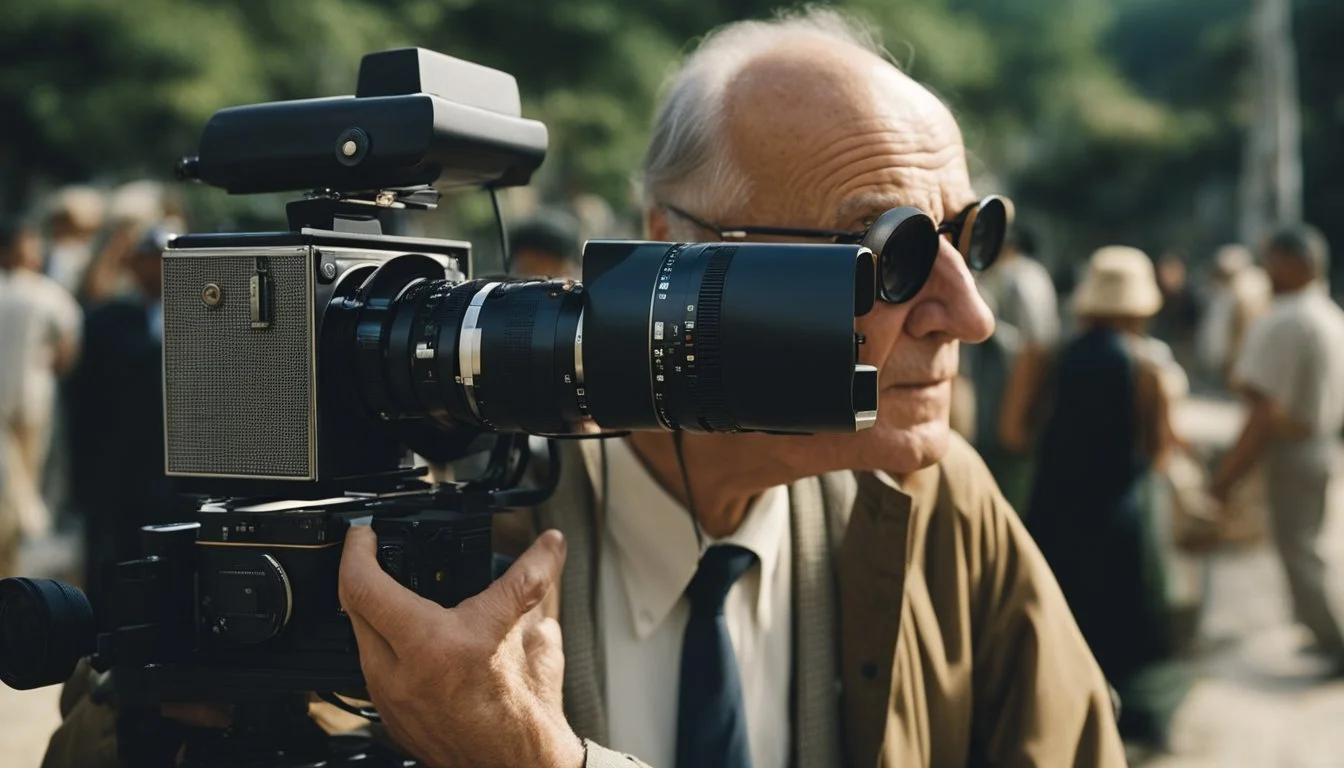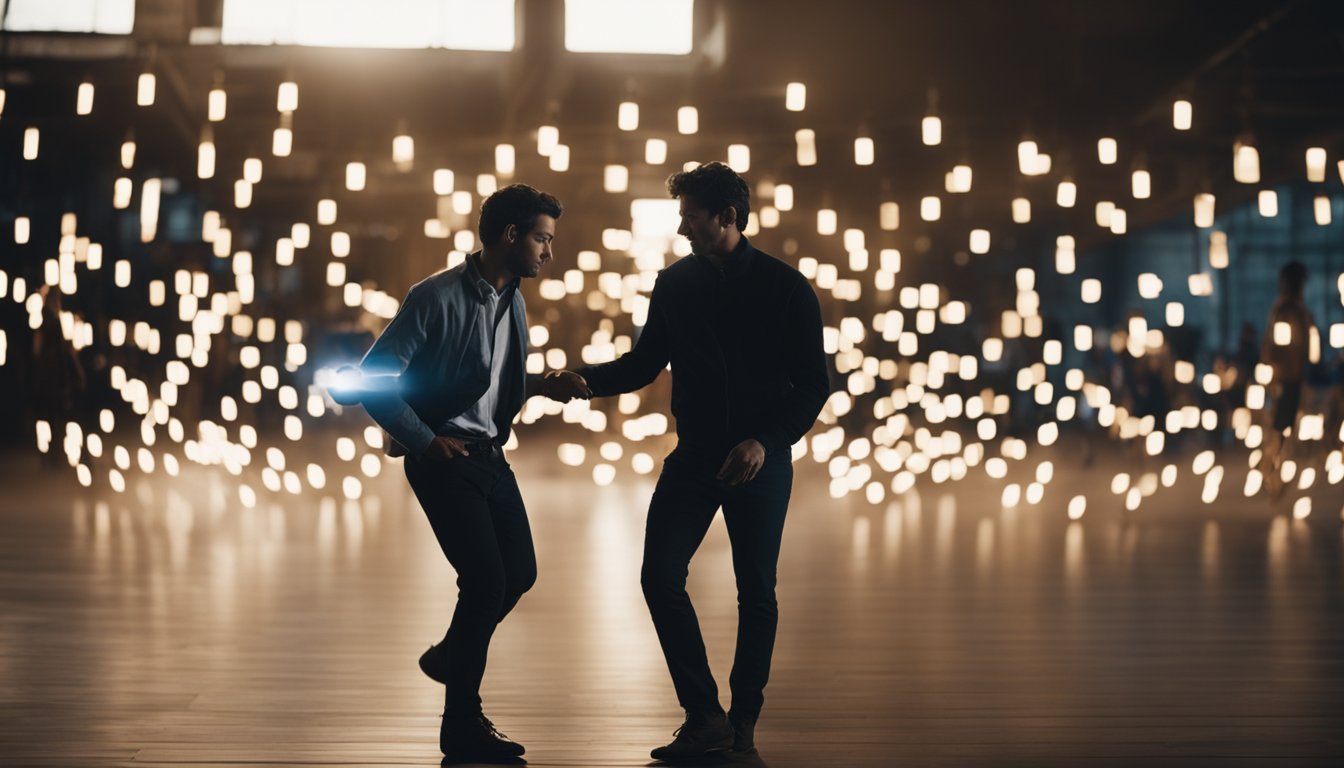Jean Rouch: Blurring the Lines Between Filmmaker and Subject in Documentary Cinema
Jean Rouch's contributions to cinema and anthropology are both innovative and profound. By blending fiction and non-fiction techniques, Rouch created a hybrid style that transcended traditional boundaries. His films challenged the separation between the observer and the observed, a bold move that redefined ethnographic filmmaking.
Jean Rouch’s unique approach lies in his commitment to collaboration with his subjects, often involving them in the storytelling process. This method not only humanized the subjects but also produced a more authentic and nuanced depiction of their lives. Films like "Chronicle of a Summer" and "The Human Pyramid" illustrate this technique beautifully, capturing genuine emotions and unscripted moments.
Rouch's vision extended to exploring the dynamics between the filmmaker and the subject, crafting a cinematic experience that is as informative as it is engaging. Through his innovative use of direct cinema techniques, Rouch succeeded in creating works that resonate with raw authenticity, leaving a lasting impact on both documentary and fiction genres.
The Life of Jean Rouch
Jean Rouch was a pioneering French filmmaker and anthropologist whose work had a profound impact on cinéma vérité and ethnographic film. His early life, initial foray into filmmaking, and subsequent innovations are significant to understanding his legacy.
Early Years and Education
Jean Rouch was born on May 31, 1917, in Paris, France. He pursued engineering at the prestigious École des Ponts ParisTech, reflecting an early interest in the sciences. His academic path took a turn after he spent time in French West Africa as a surveyor during World War II. This experience deeply influenced him, igniting his interest in anthropology and African culture.
He later studied anthropology at the Musée de l'Homme, a hub for many notable anthropologists. His training grounded him in ethnographic methodologies that would shape his filmmaking career.
Entrance into Filmmaking
Rouch's entry into the world of filmmaking began while he was conducting ethnographic research in Africa. He initially used photography to document his studies, but he soon transitioned to film. In 1947, Rouch made his first ethnographic film, Initiation à la danse des possédés, which explored the rituals of possession among the Songhai people of Niger.
His wife, Jane Rouch, assisted him in various capacities during his early projects. These initial forays revealed his interest in blending scientific inquiry with the artistic elements of cinema. Rouch employed a participatory style that involved his subjects in the filmmaking process, a practice that would become a hallmark of his work.
Innovations in Ethnographic Cinema
Rouch is credited with being one of the founders of cinéma vérité, a style characterized by naturalistic, often improvisational techniques and close interactions between filmmaker and subject. His 1960 film Chronicle of a Summer, co-directed with sociologist Edgar Morin, epitomized this approach. The film used interviews and shared experiences to reveal the inner lives of Parisians, blurring the lines between documentary and narrative cinema.
Another notable innovation was his use of voice-over narration, which brought a reflexive element to his films. Rouch's work in Africa, including films like Jaguar and Moi, un Noir, employed these techniques to present authentic portrayals of African life. His collaborative approach often involved his subjects in the storytelling, making his films a genuine co-creation.
Rouch's innovations significantly influenced both ethnographic film and broader documentary practices, leaving a lasting legacy in the world of cinema.
Ethnographic Filmmaking and Its Evolution
Ethnographic filmmaking has transformed significantly, blending documentary and fictional techniques. Jean Rouch played a crucial role in this evolution, especially through his innovative methods and notable works.
Defining Ethnographic Film
Ethnographic film is a genre that explores cultural practices, beliefs, and communities, often from an anthropological perspective. It serves as a visual means to document and analyze human societies, providing insight into their ways of life.
Jean Rouch pioneered this field by merging traditional documentary forms with fiction. His work blurred the lines between observer and participant, challenging the conventional boundaries of filmmaking. By involving his subjects in the filmmaking process, Rouch created a more dynamic and participatory form of ethnographic study.
Chronicle of a Summer: A Case Study
Chronicle of a Summer (1961) represents a landmark in ethnographic filmmaking. This film, a collaboration between Jean Rouch and sociologist Edgar Morin, captures the everyday lives and thoughts of Parisians during the summer of 1960.
This approach, known as cinéma vérité, emphasized naturalism and authenticity. The subjects' interactions and conversations provide a raw, unfiltered glimpse into their lives, bridging the gap between observer and subject.
Rouch and Morin's innovative techniques, such as direct interviews and spontaneous encounters, were revolutionary. Their work not only documented reality but also provoked reflections on the act of filmmaking itself, making Chronicle of a Summer a seminal piece in the evolution of ethnographic film.
Cinéma Vérité and Participatory Methodology
Jean Rouch, a key figure in Cinéma Vérité, utilized a participatory approach to blend the roles of filmmaker and subject, capturing authentic moments rooted in sociocultural contexts.
Principles of Cinéma Vérité
Cinéma Vérité, translating to "truthful cinema," is grounded in capturing real events and interactions. This style uses natural light, hand-held cameras, and minimal staging.
Unlike traditional documentaries, it emphasizes the filmmaker's presence and interaction with subjects.
Dziga Vertov's Kino-Pravda influenced its development, prioritizing authenticity over polished narratives. The goal is to reveal deeper truths through everyday moments and spontaneous dialogue.
Rouch's Approach to Film Subjects
Jean Rouch pioneered a participatory methodology, engaging directly with his subjects. His films often include interactions between him and his subjects, creating a collaborative storytelling process.
Chronicle of a Summer, co-created with sociologist Edgar Morin, showcases this approach, with subjects discussing their lives and Rouch actively participating. This technique helps dissolve the observer's barrier, blending observation with engagement.
Impact on Documentary Filmmaking
Rouch's innovations profoundly influenced documentary filmmaking. His methods introduced a new way to engage with subjects, promoting a more immersive and interactive experience.
Filmmakers began adopting similar techniques, leading to more dynamic and thought-provoking documentaries.
The participatory approach has since become a staple in various documentary styles, encouraging filmmakers to embrace the blurred lines between narrative and reality.
Collaboration and Interaction with Subjects
Jean Rouch's dynamic approach to filmmaking revolutionized the relationship between filmmakers and their subjects. His methods emphasized genuine interaction, while ethical considerations ensured respect and consent.
Methods of Engaging with Participants
Rouch pioneered techniques that allowed for spontaneous and genuine interactions. Using direct cinema techniques, he captured unscripted moments. This method relied heavily on long-takes and minimal intervention.
Another key method was participatory filmmaking. Rouch often invited subjects to be co-creators, giving them a voice in the narrative process. This approach helped to blur the traditional lines between filmmaker and subject, fostering a more collaborative environment.
Additionally, Rouch utilized improvisation to elicit honest reactions. By involving his subjects in the creative process, he developed a more intimate and authentic portrayal of their lives. His ability to build rapport was crucial, often spending significant time with his subjects to gain their trust.
Ethical Considerations
Rouch’s work also raised significant ethical questions. Consent was paramount in his projects. He ensured participants were fully aware of the purposes of his films and how their footage would be used.
Moreover, the issue of representation was carefully handled. Rouch sought to portray his subjects accurately and respectfully, avoiding sensationalism. He engaged in continuous dialogue with his participants, allowing them to express concerns or objections.
He also navigated the complexities of power dynamics between filmmaker and subject. Acknowledging his own influence, Rouch strived for a balanced relationship. His ethical approach was characterized by a commitment to transparency and mutual respect, setting a precedent in documentary filmmaking.
Technical Contributions and Style
Jean Rouch was a pioneer in ethnographic filmmaking, blending documentary and fiction elements. His innovative techniques and aesthetic choices have left an indelible mark on cinema.
Innovative Techniques in Filming
Jean Rouch introduced groundbreaking methods in his approach to filmmaking. He often used lightweight cameras, allowing for greater mobility and intimacy with his subjects. This enabled him to capture spontaneous moments and genuine reactions.
Rouch also utilized sync sound, recording audio in real-time rather than overdubbing in post-production. This technique provided authenticity to the dialogue and ambient sounds. Additionally, he favored long takes and unstructured shooting schedules, breaking away from traditional scripted formats.
Rouch's collaboration with subjects, actively involving them in the filmmaking process, was a key aspect of his technique. This participatory approach blurred the boundaries between the filmmaker and the subjects, leading to a more authentic representation of their lives.
The Aesthetic of Imperfection
Rouch embraced an aesthetic that celebrated imperfections. His films often retain unpolished qualities, including visible camera shakes and inconsistent lighting. These elements contribute to a raw, unfiltered depiction of reality.
He believed that imperfections added an element of truth to his work. Instead of striving for technical perfection, Rouch focused on capturing the essence of the moment. This approach often resulted in a powerful, visceral viewing experience that resonated with audiences.
The use of improvised dialogue and natural settings also added to the realistic feel of his films. By prioritizing content over form, Rouch's aesthetic choices have influenced many other filmmakers in the realm of documentary and ethnographic cinema.
Influence and Legacy
Jean Rouch stands as a monumental figure in ethnographic cinema, whose innovative approaches have left an indelible mark on film. His methods not only shaped his contemporaries but also inspired future generations of filmmakers worldwide.
Disciples and Proteges
Rouch's emphasis on collaboration and breaking conventional boundaries influenced a legion of filmmakers. One notable disciple is Jean-Luc Godard, who drew from Rouch’s cinéma-vérité style for his own revolutionary works. Similarly, Edgar Morin, a sociologist and filmmaker, co-created Chronicle of a Summer, reflecting their shared vision.
Moreover, Rouch mentored many African filmmakers, fostering a new wave of African cinema. Directors like Ousmane Sembène and Safi Faye admired and adopted Rouch’s techniques, intertwining fiction with documentary to depict African realities. These filmmakers extended his legacy by continuing to explore complex social issues through innovative storytelling.
Rouch's Influence on Modern Filmmaking
Modern documentary and fiction filmmakers alike owe much to Rouch. His approach to blending reality and fiction pioneered techniques that are now standard in both genres. The mockumentary style seen in films such as This Is Spinal Tap and The Blair Witch Project can trace its roots back to Rouch's groundbreaking work.
Contemporary directors like Agnès Varda and Werner Herzog have publicly acknowledged Rouch’s influence. Herzog's concept of "ecstatic truth" aligns closely with Rouch's blending of reel and real. Further, the interactive and participatory nature of Rouch’s films prefigured current trends in immersive and interactive media experiences, demonstrating his lasting impact on modern narrative forms.
Criticism and Analysis
Jean Rouch's innovative approach to filmmaking has received both acclaim and criticism, shaping discussions in both cinematic and ethnographic circles. While his blending of fiction and documentary techniques was pioneering, it also sparked debate on the ethics and impact of his methods.
Academic Perspectives
In academic circles, Rouch’s work is often seen as revolutionary. Scholars like Paul Henley have emphasized his unique ability to merge the observer and the observed, challenging traditional anthropological practices. His collaboration with subjects, notably in "Chronicle of a Summer," transcended mere observation.
Research highlights his influence on cinéma-vérité, where he pushed boundaries by allowing subjects greater agency in storytelling. This method, though groundbreaking, has raised questions about objectivity and truth in documentary filmmaking. Critics argue that these elements blur the lines too much, potentially compromising the film’s credibility.
Reception by the Ethnographic Community
Ethnographers have viewed Rouch with a mix of admiration and skepticism. His films in Africa, such as "The Human Pyramid," provided valuable cultural insights but also faced scrutiny. Some in the ethnographic community believe his presence may have altered the very behaviors he aimed to document.
His method of participatory filmmaking often skipped traditional ethnographic rigor, leading to debates about the accuracy and ethical considerations of his work. Yet, supporters argue that Rouch democratized the documentary process, fostering deeper connections between filmmaker and subject.
In their view, his films remain vital for their authenticity and innovation, despite the controversies.
Selected Filmography
Jean Rouch's work in film is marked by a unique blend of ethnography and innovative cinematic techniques. His influential films often challenge traditional boundaries, forging new paths in both documentary and fiction.
Key Works of Jean Rouch
Chronicle of a Summer (1961)
Chronicle of a Summer is perhaps Rouch's most well-known film. Co-directed with Edgar Morin, this film is a seminal example of cinéma vérité. It explores the lives of Parisians during the summer of 1960, blending real-life interviews with staged scenes. Rouch and Morin's presence in the film as both creators and participants was pivotal, creating a self-reflective narrative on the nature of truth and filmmaking.
The Human Pyramid (1961)
In The Human Pyramid, Rouch continued to blur the lines between reality and fiction. Set in Ivory Coast, this film depicts interactions between black African students and white French students. Rouch used a collaborative approach, encouraging the non-professional actors to improvise, which resulted in an authentic and sometimes unsettling portrayal of social dynamics and racial tensions of the time.
Moi, un Noir (1958)
Moi, un Noir ("I, a Black Man") is a groundbreaking film in which Rouch gives voice to Nigerian immigrant workers in Abidjan, Côte d'Ivoire. The film employs a docufiction style, where the subjects narrate their own lives and fantasies, merging real-life struggles with imagined scenarios. It broke away from traditional ethnographic film methods, offering a deeply personal and innovative view of post-colonial African life.
Rouch's films are crucial to understanding his impact on both anthropology and the cinematic world. His approach consistently challenged and transcended conventional boundaries, leaving a lasting legacy.
Rouch’s Philosophical Insights
Jean Rouch's approach to filmmaking was deeply intertwined with his philosophical perspective on culture and society. He viewed the filmmaker as an intricate part of the anthropological study, bridging the gap between observer and participant.
Views on Culture and Society
Jean Rouch believed that culture and society are fluid, dynamic entities that cannot be captured fully through traditional, static methods. His films often emphasized the lived experiences of individuals within their cultural contexts.
Culture was seen by Rouch not merely as a set of customs and practices but as a continually evolving interaction among people. This perspective led him to prioritize participant observation, which involved immersing himself in the daily lives of his subjects.
Rouch argued that ethnographic films should not only present cultural facts but also provoke thought and dialogue about the complexities of human societies. By focusing on the interactions and narratives of ordinary people, he challenged the boundaries of conventional ethnography.
The Filmmaker as an Anthropologist
Jean Rouch redefined the role of the filmmaker in anthropological study. He believed that the filmmaker and subjects should engage in a collaborative process. This collaborative ethnography was central to his practice, as it blurred the lines between film creator and film subject.
By incorporating the cinéma vérité style, Rouch aimed to present a more authentic representation of reality. His technique often involved spontaneous filming and engaging directly with the subjects to capture genuine moments and expressions.
Rouch's films, like Chronicle of a Summer, exemplified his belief in breaking down the barriers between the observer and the observed. He thought that by doing so, the filmmaker could achieve a deeper understanding of the cultural and social dynamics at play.





